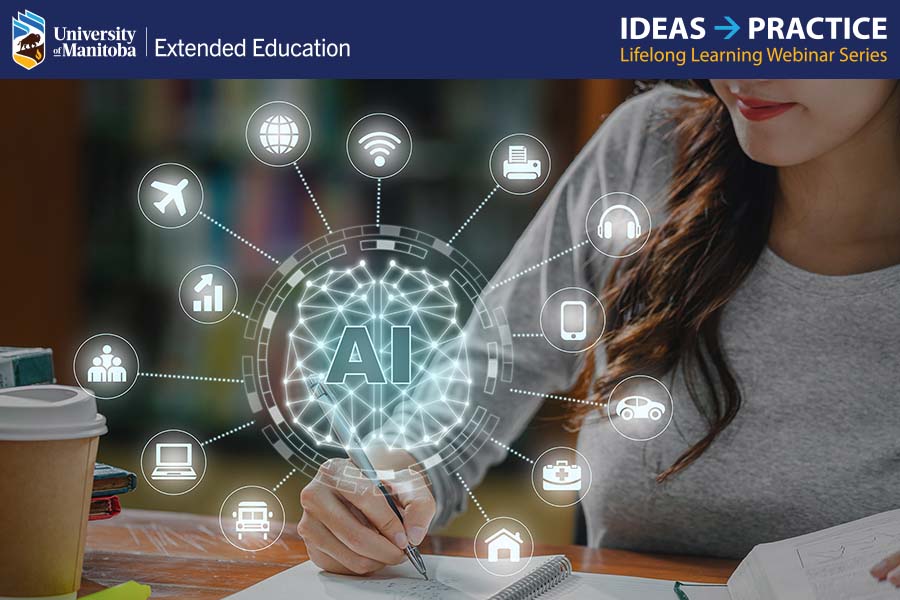
The webinar series continues
AI can support good learning, help to develop exceptional students
Lifelong learning AI webinar series continues
Teaching is a caring profession, and advancements in AI offer opportunities for teachers to better care for their students by adapting and adopting it to education to support good learning.
That was the word from Mike Sharples, Emeritus Professor of Educational Technology at The Open University, UK in conversation with Rod Lastra, lifelong learning professional, in UM Extended Education’s latest webinar, The AI Horizon of Higher Education: Emergent Tools and Policy Considerations. The series continues.
“What’s the impact if we can write a paper at the touch of a button,” asks Sharples. “Technology is in the hands of students, disrupting traditional education. But all evidence says students don’t want to cheat, they want to learn. Universities need to work with it to develop a strategy. With new opportunities can come new ways of dynamic assessment.”
It’s not about insisting students avoid AI. If they use it as a tool, and acknowledge it, that’s fine, says Sharples. Assessment should not just be on one piece of writing. This is an opportunity to rethink assessment and make it process-based.
And anyway, it is not easy to determine if writing has been created by AI because AI detectors don’t work. “The software attempts to detect patterns but it is not at all reliable.”
Creating exceptional students
Students may well use AI for personal tutoring, guides, and creativity. And if it creates mundane writing and creative work for them, students should be encouraged to critique that and do better, he says. “We don’t want our students to be mundane. We want them to rise above, to be exceptional. We want to develop exceptional students.”
According to recent surveys, students are the early adopters, well ahead of academics and teachers. “Eighty to 90 per cent of use is by students. Only 20 to 30 per cent is by academics and teachers. There is a real imperative for AI literacy.”
AI is embedded in many things already. New generation AI is in Microsoft, Google, Apple and Adobe products. Soon all tools will use AI. But how will we use it? Will it help us or are we handing tasks over to a machine?
“We need ethical guardrails, but also we need to look at how institutions can work with the technology to develop systems with educational principles in them. Education and AI companies working together- it’s exciting.”
Guidelines not regulations
The UK government has a pro-AI strategy, says Sharples. “We have a long tradition of deep computing, but clear guidelines on safety and responsibility. The Russell Group (24 UK research universities) has developed principles for responsible but creative use of AI. They are not regulating AI but have a set of principles to abide by. Others have also adopted them or others like this.”
Sharples joined the Department of AI at the University of Edinburgh in the late 1970s and was one of the first to complete his PhD in generative AI. He developed software to explore creative writing and language.
“Generative AI is not new. It has a long and fascinating history. I joined as the first wave was coming. There have been rises and falls since then. My journey was to develop tools to support students in writing development, designing tutoring systems.”
When ChatGPT came along, Sharples was surprised that it could understand context. “Until then, we had to code context or it was not there. How does it know? It is doing more than taking data and repurposing it. It has layers, some kind of emergent world model. It is doing something more than text processing, interpreting structure and context. But it gets some things wrong.”
Not human, uncaring
So, we need to use it with great care, he says. “At the moment, it is not a substitute for human teaching. We need to evaluate the output with knowledge, evidence, correct information. It should always be used with a human teacher. Teaching is a caring profession. AI is intrinsically uncaring.”
AI can be used to summarize text, extract the essence, make comparisons, do translations. “It can do our mundane tasks like lesson planning. It can be an aide to creativity, brainstorming and design. But it is not a proxy for human intelligence. It does not have human experience. It has not seen a sunset or smelled freshly mown grass.”






